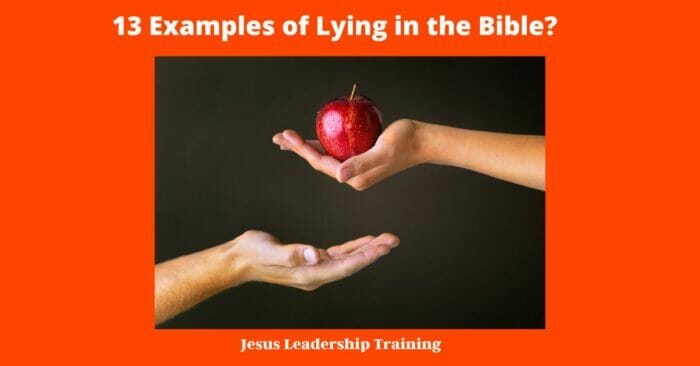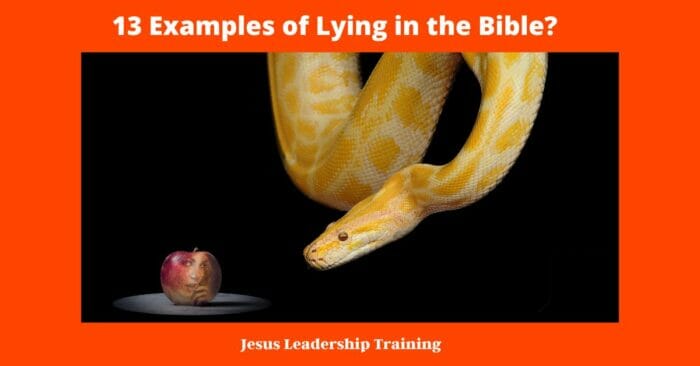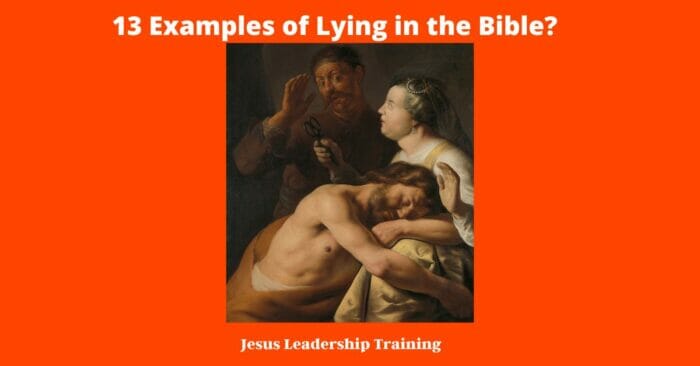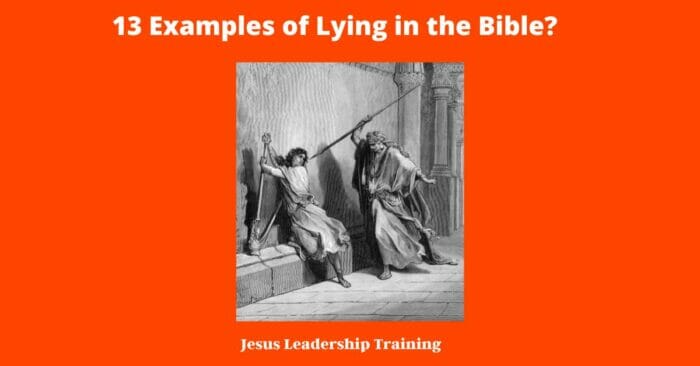Who Lied in the Bible – 13 Examples of Lying in the Bible? – Lying is a sin that is often mentioned in the Bible. In fact, there are quite a few examples of it throughout the scriptures. But what does the Bible say about lying? Is it always wrong? Let’s take a look at some of the examples of lying in the Bible and see what we can learn from them!
Table of Contents
Who Lied in the Bible – Examples of Lying in the Bible?
Bible examples of lies (people)
- Abraham
- Baalam
- David
- King Saul
- Ahab
- Jezebel
- Ananias and Sapphira
- Peter
- Pilate
- Satan
- Hebrew Midwives
- Josephs Brothers
- Cain
- Snake – Garden

What is Lying?
Examples of Lies in the Bible – Some people would say that lying is simply speaking a falsehood. However, the Bible tells us that there is more to it than that. In Proverbs 6:16-19, we are told that lying is sinful because it is something that God hates. Lying is also deceitful and dishonest. ( Lying Tongue)
It is an attempt to trick or deceive someone. When we lie, we are not being truthful. We are hiding the truth from others.
here’s a table of some of the Bible characters who lied in the scriptures:
| Bible Characters | Instance of Lying |
|---|---|
| Adam and Eve | After eating from the tree of the knowledge of good and evil, they tried to hide from God and did not admit their disobedience upfront (Genesis 3). |
| Cain | After killing his brother Abel, Cain lied to God about his knowledge of Abel’s whereabouts (Genesis 4:9). |
| Abraham | Abraham lied about his wife, Sarah, being his sister out of fear that he would be killed (Genesis 12:10-20; 20:1-18). |
| Isaac | Similar to his father, Abraham, Isaac also lied about his wife, Rebekah, being his sister (Genesis 26:7-11). |
| Jacob | Jacob deceived his father, Isaac, into giving him the blessing that was intended for his brother, Esau (Genesis 27). |
| Potipar’s wife | She falsely accused Joseph of trying to seduce her after he rejected her advances (Genesis 39). |
| Delilah | Delilah deceived Samson into revealing the source of his strength, leading to his downfall (Judges 16). |
| Peter | Peter denied knowing Jesus three times during the night of Jesus’ arrest, as Jesus had predicted (Matthew 26:69-75). |
| Ananias and Sapphira | This couple lied about the amount of money they had received from the sale of their property, keeping a portion for themselves (Acts 5:1-10). |
Each of these instances serves as a lesson and provides different contexts in which the consequences of lying are explored.
Lying is a form of stealing because we are taking something that belongs to the person we are lying to – their trust. We are also breaking the Ninth Commandment which tells us not to bear false witness against our neighbor.
When we lie, we are damaging our testimony and our relationship with God. Lying is a serious matter, and we need to be careful not to do it.
What is the Purpose of Lying? (English)
The purpose of lying is to deceive people. When we lie, we make up something that is not true in order to get someone to believe it. We might lie about our age, our accomplishments, or where we were last night.
We might even lie about our feelings, telling someone we love them when we really don’t. But why do we lie? And what are the consequences of our lies? Let’s take a closer look at the purpose of lying and how it affects our lives and relationships.
One reason people might lie is to protect themselves from harm. For example, if someone is in a dangerous situation, they might lie about their location in order to prevent their captors from finding them.
Another reason people might lie is to avoid hurting someone’s feelings. For example, if you are asked to give your honest opinion about someone’s new outfit and you think it looks terrible, you might lie and say you like it instead of telling the truth and hurting their feelings. (little white lie)
However, just because lying might sometimes be understandable, that doesn’t mean there aren’t also consequences for our actions. One consequence of lying is that it can damage relationships. If you tell your friend you love their new outfit but then you are seen making fun of it behind their back, they will no longer trust you. In fact, they will probably be less likely to confide in you in the future because they will fear being betrayed again.

Another consequence of lying is that it can lead to more lies. Once you have told one lie, you often have to tell more lies to cover up the first one. This can quickly become complicated and confusing, and can lead to serious consequences.
For example, if you lie about your age to get into a club, you might then have to lie about your ID when the bouncer asks for it. If you are caught in this web of lies, you could be denied entry into the club or even arrested for underage drinking.
As we can see, there are both positive and negative purposes for lying. Although there may be some situations where lying seems like the best option, it is important to consider the potential consequences before deciding whether or not to tell a falsehood.
What is the Consequence of Lying (Bible Studies)
The Bible has a lot to say about lying. In fact, there are over 30 verses that mention lying or deception. And while the consequences for lying vary depending on the context, all forms of deception are condemned in Scripture.
Perhaps the most well-known passage is Proverbs 6:16-19, which lists seven things that the Lord hates–and one of them is “a false witness who speaks lies.” (Old Testament) This indicates that not only is lying bad, but it’s also an act of hostility against God himself. Furthermore, in John 8:44 Jesus says that Satan is “a liar and the father of lies.” (son of man) New Testament
This shows us that deception is rooted in evil and goes against everything that God stands for. As believers, we are called to be truthful in all our dealings (Ephesians 4:25), because when we lie, we are aligning ourselves with Satan rather than with God.
Where Does Lying Originate?
Christians Trace Lying to Its Origin in the Devil. Question: “Where does lying originate?” Answer: Satan is “a liar and the father of it” (John 8:44). He is “the prince of the power of the air” (Ephesians 2:2) who deceives the world (Revelation 12:9).
His method are many-faceted, but his overarching methods can be summarized as perverting the truth, covering up his lies with vain philosophies, and outright lying.
The devil’s tactic of perverting the truth is seen immediately after Adam and Eve sinned. God tells them they will die if they eat from the tree of knowledge of good and evil. The serpent then tells Eve that she will not surely die and that eating from the tree will make her wise (Genesis 3:4-5).
The serpent was telling half-truths—Eve would not die immediately, and she would become wiser—in order to get her to sin. The devil continues this tactic throughout history. For example, he twisted God’s character, leading people to believe that He was a jealous, tyrannical God instead of a loving, merciful Father (Exodus 34:14; John 3:16-17).

Similarly, the devil has used vain philosophies to cover up his lies throughout history. In Genesis 3:1, he asked Eve, “Did God really say . . .” This question introduced doubt into Eve’s mind about what God had said. When people doubt what God has said, they are more open to believing Satan’s lies.
For instance, during World War II some doubted whether the Holocaust was really happening. As a result, people were more likely to believe when Hitler denied that the Holocaust was occurring. This was one of his biggest lies.
Finally, Satan outright lies. While speaking to Jesus in John 8:44, he says, “I do not accuse you because I do not stand alone.” Of course, this was a lie—Satan certainly was not alone; millions of demons were with him (Matthew 12:43-45).
He also lied when he told Ananias and Sapphira that it was okay for them to keep part of the money they had been given for selling their land; they did not need to give all of it to the church (Acts 5:3). As these examples illustrate, Satan will say anything to achieve his goal, which is ultimately our eternal destruction (John 10:10).
Why is it Better to Tell the Truth?
There are many reasons why it is better to always tell the truth. The first reason is that it is the morally right thing to do. It is important to live a life that is based on principles and values, and one of those values is honesty. Additionally, telling the truth is essential for maintaining relationships of trust.
If we cannot be honest with the people we care about, our relationships will suffer. Furthermore, honesty is required for personal growth. We cannot learn and grow if we are not honest with ourselves about our strengths and weaknesses.
Finally, being honest with others shows respect for their intelligence and ability to handle the truth. Telling lies, on the other hand, diminishes respect and creates mistrust. For all of these reasons, it is always better to tell the truth.
Steps That I can take to always be Truthful?
Truthfulness is critical in every aspect of our lives. The following are steps that we can take to always be truthful:
• Pray for God’s help– We need God’s help to always be truthful. We should pray that God would give us the strength to always tell the truth and never lie. (Ask the Holy Spirit for Help)
• Avoid situations where we might be tempted to lie– There are certain situations where we might be tempted to lie. We should avoid these situations if possible.
• Be honest with ourselves- We need to be honest with ourselves before we can be honest with others. If we are not honest with ourselves, it will be difficult to be honest with others.
• Tell the truth even when it is difficult– It is not always easy to tell the truth. Sometimes, we might be tempted to lie because it is easier or it will save us from getting in trouble. But we need to resist this temptation and tell the truth even when it is difficult.
• apologize when we have lied– If we have lied, we need to apologize and ask forgiveness from those who we have lied to.
By following these steps, we can take the first step toward always being truthful.

Does God lie?
The Bible is very clear that God does not lie. In Titus 1:2, Paul said that God “cannot lie.” Hebrews 6:18 says it is “impossible for God to lie.” In Numbers 23:19, we’re told that “God is not a man, that he should lie.”
So we see from Scripture that it is not in God’s character to lie. He is holy and just and true, and His Word is absolutely reliable. We can trust what He says because He cannot lie. When we understand this, we can have confidence in all of God’s promises, knowing that He will always keep His Word.
This is a great comfort to us as we journey through life because we know that our heavenly Father is always faithful.
We are Made in the Image of God, Should we Lie?
It is impossible to read the Bible and not realize that we are made in the image of God. From the very beginning, God Himself says that we are created in His image (Genesis 1:26-27). This means that we share certain characteristics with God, such as having a mind, will, and emotions.
We are also able to reason, make choices, and experience love. Because we are made in the image of God, lying goes against our very nature. When we lie, we are distorting who we are meant to be. We are marring the image of God that is within us.
Not only does this hurt us as individuals, but it also harms our relationships with others. When we lie, we break down trust and build up walls between ourselves and others. Ultimately, then, lying goes against who we are as people made in the image of God.
It is an act that goes against our nature and damages our relationships with others. As such, it is something that we should avoid at all costs.
Why did God Give us the Ability to Lie?
One of the most difficult things to understand is why God would give us the ability to lie. After all, lying is considered to be a sin, and it can lead to all sorts of problems in our lives. So why would a loving and perfect God give us something that can cause so much harm?
The answer may lie in the fact that, while lying is certainly a sin, it is also a sign of our humanity. Lying is something that we do because we are imperfect beings who are capable of making mistakes. And while God could have created us as perfect beings who never lied, he decided instead to give us free will.
This allows us to choose between right and wrong, and it gives us the opportunity to learn and grow from our mistakes. In other words, our ability to lie is just one more example of God’s love for us. He wants us to be able to make our own choices, even if those choices are sometimes wrong.

List of 10 Bible Verses warning against Lying?
The Bible warns us against lying in many verses. Here are ten of them:
- “You shall not give false testimony against your neighbor.” – Exodus 20:16
- “Do not lie to each other, since you have taken off your old self with its practices.” – Colossians 3:9
- “Whoever conceals their sins does not prosper, but the one who confesses and renounces them finds mercy.” – Proverbs 28:13
- “Lying lips are an abomination to the Lord, but those who act faithfully are his delight.” – Proverbs 12:22
- “Better is a poor person who walks in their integrity than one who is crooked in their ways and is a fool.” – Proverbs 19:1
- “The way of a fool is right in their own eyes, but a wise person listens to advice.” – Proverbs 12:15
- “Trust in the Lord with all your heart and lean not on your own understanding; In all your ways acknowledge him, and he will make your paths straight.” – Proverbs 3:5-6
- “There is a way that seems right to a man, but its end is the way to death.” – Proverbs 14:12
- “Every word of God proves true; he is a shield to those who take refuge in him.” – Proverbs 30:5
- “Do not be deceived: God cannot be mocked. A man reaps what he sows.” – Galatians 6:7
How lying is condemned in the Bible
The Bible has a lot to say about lying. In the book of Proverbs, we are warned that lies “lead to violence and destruction” (Proverbs 12:17-19 NLT). The book of Ephesians tells us that our speech should be “seasoned with salt” (Ephesians 4:29 ESV), and part of that seasoning is honesty. When we lie, we are not being honest with others or with God.
Lying is an act of deception, and the Bible condemns all forms of deception (Leviticus 19:11, Colossians 3:9). So if you’re struggling with lying, know that you’re not alone. But also know that there is hope.
The Bible offers forgiveness for all who confess their sins and turn from their wicked ways (1 John 1:9). If you’re ready to start living in truth, God is ready to forgive you and help you take your first steps forward.
7 Who Lied to God in the Bible – Examples of Lies in the Bible
Below is a table outlining instances where individuals lied to God in the Bible, including the names, verses, and contexts of each scenario:
| Name | Verses | Context |
|---|---|---|
| Ananias & Sapphira | Acts 5:1-11 | This couple sold property and lied about the amount of money they were donating to the church. Both fell dead after being confronted by Peter. |
| Cain | Genesis 4:9 | After killing his brother Abel, Cain lied to God when He inquired about Abel’s whereabouts. |
| Sarah | Genesis 18:12-15 | Sarah laughed and lied about laughing when God told Abraham that she would have a son in her old age. God knew she laughed within herself. |
| Jacob & Rebekah | Genesis 27:19 | Jacob, with the help of his mother Rebekah, deceived his father Isaac to receive Esau’s blessing. He lied saying he was Esau. |
| Gehazi | 2 Kings 4:22-27 | Gehazi, the servant of Elisha, lied to Naaman about Elisha needing silver and clothing and later lied to Elisha about where he had been. |
| David | 2 Samuel 11:6-13 | David attempted to cover up his sin with Bathsheba by bringing her husband Uriah home from the battle, hoping he would sleep with his wife. When this failed, David had Uriah placed in the front lines where he was killed. |
| Peter | Luke 22:54-62 | Peter denied knowing Jesus three times before the rooster crowed, just as Jesus had predicted, out of fear of persecution. |
It’s key to learn from these scenarios and understand the severe consequences of lying to God while embracing truthfulness and integrity in our daily walk with God.
- Bible Characters Who Lied
The Bible features several characters who lied, including figures like Abraham, Jacob, and Peter. These instances serve as lessons about the consequences of dishonesty. - Bible Lessons About Lying
The Bible contains lessons and teachings about the sin of lying and the importance of truthfulness. It emphasizes the value of honesty and integrity in one’s character. - Bible Stories About Lying
Bible stories that involve lying include the story of Ananias and Sapphira in the Book of Acts and Jacob’s deception of his father Isaac. These stories illustrate the consequences of deceit. - Bible Stories About Truth and Lies
Bible stories about truth and lies emphasize the importance of truthfulness and the negative consequences of deception. These stories provide moral lessons. - Bible Story About Lying
The story of Ananias and Sapphira in the Book of Acts is a notable example of a Bible story about lying. Their dishonesty led to severe consequences within the early Christian community. - Examples of God Lying in the Bible
There are no examples of God lying in the Bible. God is portrayed as truthful and trustworthy throughout the biblical texts. - Examples of Lying in the Bible
The Bible contains numerous examples of lying, including instances involving deception, false statements, and betrayal. These examples serve as cautionary tales. - Famous Liars in the Bible
While the Bible features characters who lied, it does not highlight any figures as famous liars. Instead, the focus is on the consequences of lying and the importance of repentance and truthfulness. - How Many Times Is Lying Mentioned in the Bible
The term “lying” and related words are mentioned multiple times in the Bible, particularly in the context of warning against deceit and promoting truthfulness. - Lies Told in the Bible
Lies told in the Bible are documented in various stories, such as Jacob’s deception of Isaac and the false testimony against Jesus during his trial. These instances illustrate the impact of dishonesty.
New Testament Commentaries
Below is a table featuring some renowned New Testament commentaries, their publishers, and websites where they can be found. Please note that availability may vary and it’s always beneficial to check multiple sources for acquiring these commentaries.
| Commentary Name | Publisher | Website |
|---|---|---|
| The New International Commentary on the New Testament | Eerdmans | Eerdmans |
| Word Biblical Commentary | Zondervan | Zondervan |
| Baker Exegetical Commentary on the New Testament | Baker Academic | Baker Academic |
| The New Testament for Everyone | Westminster John Knox Press | Westminster John Knox Press |
| Tyndale New Testament Commentaries | InterVarsity Press | InterVarsity Press |
| Expositor’s Bible Commentary | Zondervan | Zondervan |
| The Anchor Yale Bible Commentary | Yale University Press | Yale University Press |


Final Thoughts – Examples of Lying to God in the Bible
Lying is Rooted in our sinful nature. The more we become like our father the less we sucuumb to Satan’s likeness in being the Father of Lies. God Loves Truthful Lips,and we are tested as a human being in a difficult situation to follow God’s Word. A Deceitful Heart will thwart good work, same as a deceitful tongue will prevent us from good things that god would give us. A wicked man will tell white lies. same as false prophets, telling a false report.
God Bless Greg


